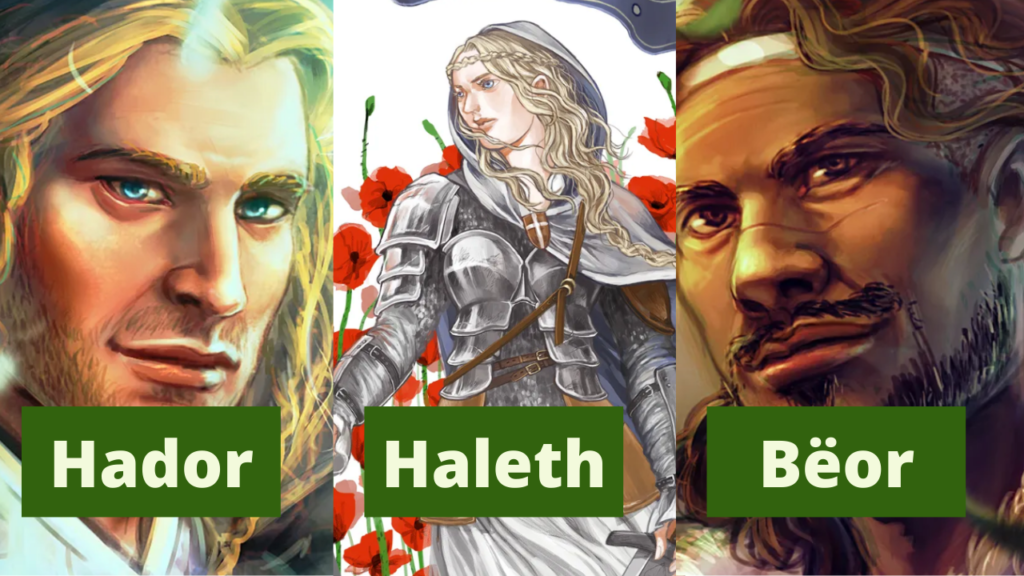The first Elf-friends were the Men of the Three Houses of Bëor, Haleth and Hador, and they are referred to as the Edain.
Bëor
King Felagund was originally believed to be one of the Valar. He would later figure he could read in the minds of Men, who had dealings with the Dark Elves and learned much of their speech. Felagund was able to converse with Bëor, speaking in his language, the language of Bëor.
Then, when Men awoke in Hildórien, the spies of Morgoth were watchful, and the Elves knew nothing at first. However, a darkness lay upon the hearts of Men and the Doom of Mandos was perceived clearly even in the people of the Elf-friends.
There were very few men at the time, but Morgoth grew afraid of the growing power and unity of the Elves and Men.
Later, Felagund learned from Bëor there were many other men of like mind who were also journeying westward.
The Green-elves were troubled by the coming of the Men, and sent messengers to Felagund when they found out that a lord of the Eldar among Sea was with them.
Túrin was also in the House of Bëor, as his mother Morwen- who was the daughter of Baragund – was there. Most there were dark and brown-haired, with grey eyes and were also most like the Noldor.
Haleth
The House of Haleth was named after Lady Haleth, the leader of the Haladin – or the People of Haleth.
Haleth was Haldad’s daughter, and was a woman of great heart and strength. She had a twin brother, Haldar, who tried to save his father when he was slain by the Orcs but was hewn down beside him.
Caranthir gave Haleth great honor by recompensing her father and brother, but Haleth didn’t want to be guided or ruled.
“Therefore she thanked Caranthir, but answered: ‘My mind is now set, lord, to leave the shadows of the mountains, and go west, whither others of our kin have gone.’” (Silmarillion, “Of the Coming of Men Into the West”)
Haleth was chosen as chief by the Haladin and she led them to Estolad. She remained chief while her days lasted, and then it was passed on to Haldan, the son of her brother. She did not wed.
Haleth wanted to move west, and led her people there despite them being against this counsel. They went without the help of the Elves, and journeyed through the Mountains of Terror and the Girdle of Melian before finally crossing over the Brithiach. That road was not to be taken without aid.
After traveling to such new lands, they remained while trying to mimic their old lives. But there was no returning by then. However, many loved Lady Haleth and wanted to go where she went and follow her into the Forest of Brethil, between Teiglin and Sirion. Many of her folk returned eventually and Brethil was claimed as part of his realm.
Felagund had decided that Haleth should dwell free there, after hearing all that had befallen the people of Haleth. However, the condition was that only her people can guard the Crossings of Taeglin against the enemies of the Eldar, and no Orcs can enter their woods.
“And Haleth dwelt in Brethil until she died; and her people raised a green mound over her in the heights of the forest, Tûr Aretha, the Ladybarrow, Haudh-en-Arwen in the Sindarin Tongue.” (Silmarillion, “Of the Coming of Men into the West”)
Thus, the Men were simply allies of the Elves in war, but were marching under their own leaders while delighting in their friendships with the Elves.
They were similar to the People of Hador, but shorter in stature and less eager for lore.
Hador
The House of Hador, or the Third House of the Edain, was named after Hador the Golden-haired, or the Lord of Dor-lómin.
Hador Lóridol entered the household of Fingolfin in his youth and he was loved by the King. Fingolfin gave the Lordship of Dor-lómin, and gathered the people of his kin to their land. Only the Elven-tongue was spoken there, but the common speech of Númenor they had known was not forgotten.
After the Men of the Three Houses grew and multiplied, the House of Hador, the peer of Elven-lords, was the greatest among them.
“His people were of great strength and stature, ready in mind, bold and steadfast, quick to anger and to laughter, mighty among the Children of Ilúvatar in the youth of Mankind.” (Silmarilliion, “Of the Coming of Men Into the West”)
As a result, the Edain had increased longevity after coming to Beleriand, as Bëor died after reaching the age of 390 years – the Elves noticed quickly the swift waning of Men, grieving the loss of their friends.
